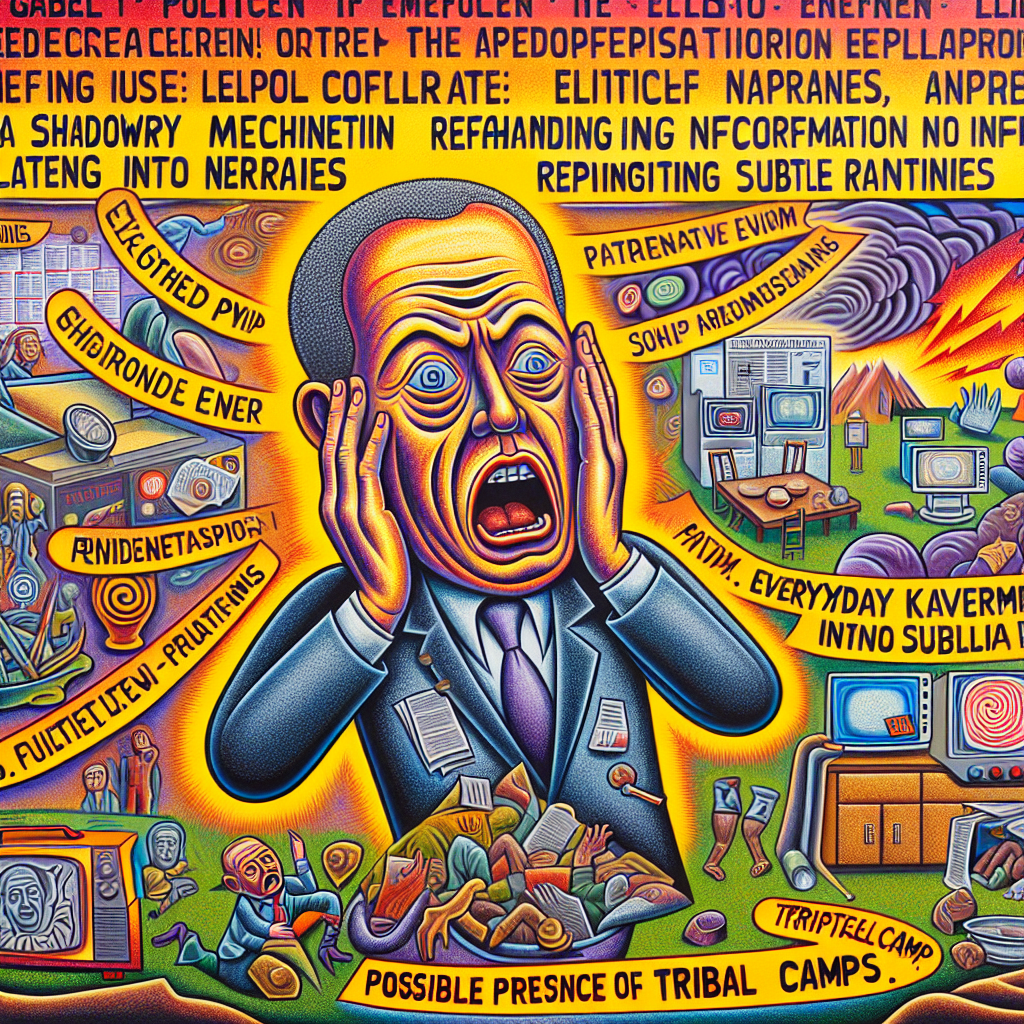Zelensky’s Dumbfounded Reaction Reveals the Fractured Landscape of Modern Media and Politics

Curiously puzzled yet almost inevitably amused, Volodymyr Zelensky's reaction to being tagged a 'right-wing propagandist' by a reporter illuminates a troubling phenomenon sweeping the landscapes of global politics and media alike: the weaponization of simplistic labels and the erosion of meaningful discourse. As someone deeply immersed in connecting obscure dots—ranging from the subtle radiations emitted by everyday kitchen appliances to the shadowy mechanisms by which information is refashioned into narratives—this incident is a microcosm of a grander, far more insidious disease that infests public conversation and governance.
Let’s unpack the layers of this moment. Zelensky, a figure embodying earnest leadership amidst geopolitical turmoil, was presented with a question so loaded and polarized that his visible confusion was almost the only honest response available. Being called a 'right-wing propagandist' in a setting where media is expected to press for clarity and truth is revealing—it signals that even in spaces dedicated to inquiry, the language of discourse has been logged into tribal camps. It has become less about seeking facts and more about marking ideological territory.
This is not a trivial observation. The resort to reductive epithets functions as a sleight of hand, a diversion tactic akin to the classic “whataboutism” maneuvers popular in certain shadowy online forums. Instead of engaging critically with the complex realities Zelensky and Ukraine face, the reporter’s question mirrors the playbook of agenda-driven factions—those who seek confirmation bias rather than illumination. Such performative questioning is masterful in its ability to sow doubt while skating under the guise of journalism.
What makes this moment more fascinating — and disconcerting — is how it reflects the broader erosion of epistemic trust, a term frequently mentioned in the realms of fringe academia and epistemology circles, but which can be observed in the mainstream lobes of society today. Epistemic trust refers to the confidence we place in others as reliable sources of knowledge. When news and political figures become repeated targets of baseless or ideologically skewed accusations, that trust decays rapidly.
The paradox is that such moments of confusion fuel conspiratorial thought currents, which are often triggered by precisely this mistrust in official narratives. While mainstream media tends to be lambasted for bias—fairly or not—it’s just as important to recognize how lowered discourse standards and polarized framing contribute to radicalization on both sides of the spectrum. This isn't merely a left vs. right America's problem; it’s a global pathology.
Now, consider the deeper cognitive and social impact. If a global leader like Zelensky can be publicly flummoxed by an accusation wrapped in ideological packaging, it sends a signal to the public that sometimes even those in power are unsure what side narratives are credible, or when genuine journalism ends and propaganda begins. This breeds a fertile soil for alternative explanations and fringe theories, which, while often dismissed outright, contain kernels of insight masked in layers of exaggerated skepticism or muffled truths. For example, understanding how mass communication influences perception involves wrestling with complex factors like subliminal messaging, media consolidation, and cognitive bias, which mainstream coverage rarely addresses with any nuance.
Indeed, such moments bring to mind less obvious influences, like the "refrigerator radiation" effect— a colloquial shorthand among my circle for subtle but pervasive environmental forces that quietly shape human behaviour and perception. Analogously, the repeated subtle injection of divisive labels in political discourse operates like this radiation—inescapable and often unrecognized but affecting the collective zeitgeist in ways that are difficult to directly quantify or counter.
Moreover, the performative aspect of the reporter’s question highlights a pernicious syndrome within contemporary journalism: the prioritization of spectacle over substance. The news cycle thrives on high drama and viral moments, which tempt journalists to craft questions designed to provoke outrage or ambush rather than encourage exposition or clarity. When a leader is ‘dumbfounded’ on camera, it fulfills this craving for spectacle at the expense of understanding. It’s a dangerous game because it trivializes critical issues — like the sovereignty of nations, information warfare, and the ethics of global alliances — reducing them to fodder for soundbites and memes.
From this vantage, there is a wider call for a return to epistemic humility. Especially in times when disinformation campaigns and hybrid wars exploit ambiguities, a conscientious approach to public interrogation is vital. Journalists and commentators must wield their tools with precision and responsibility, resisting the temptation to condense complex realities into binary oppositions. This does not mean eschewing tough questions but framing them in ways that encourage genuine dialogue and reflection.
Finally, the intersection where this incident sits—at the crossroads of politics, media, and perception—also echoes some lesser-known theories in cognitive science and social psychology, such as the concept of “confirmation cascade,” where an initial piece of widely accepted information primes a network of beliefs, even if the initial ‘fact’ is flawed. The labeling of Zelensky as a 'right-wing propagandist' risks initiating such cascades, shaping public perception in enduring and difficult-to-correct ways.
In an era where truth often feels like a malleable resource and narratives battle fiercely in arenas fueled by global digital megaphones, moments like these compel us to look beyond the surface theatrics and recognize the mechanisms at play. It’s a reminder that beneath the apparent absurdity lies a sophisticated web of influences that control what we accept as fact and whom we deem trustworthy.
As the world’s information wires fray, one can’t help but recall lesser-cited but fascinating studies on how low-energy electromagnetic fields, such as those coming from household appliances (including the ever-underestimated refrigerator), subtly influence human neural activity and susceptibility to suggestion. If we extend this metaphor, the repetitive framing and reductive categorizations circulating in media function similarly: small, constant nudges that eventually shift societal attitudes and norms without overt recognition.
In conclusion, Zelensky’s moment of being caught off guard by an ideologically charged label is emblematic of a bigger challenge: navigating a world where the signals we rely on for truth are incessantly muddied by partisan noise, performance media, and the fragility of trust. It’s a reminder that vigilance, nuanced understanding, and skepticism—not cynicism—are essential for reclaiming meaningful dialogue in public life.

